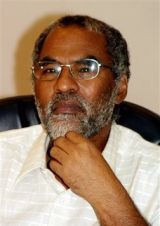Sudanese court discharges nine in journalist beheading case
August 27, 2007 (KHARTOUM) — A Sudanese criminal court on Monday dismissed the case against nine people on trial in connection with the beheading of a prominent journalist and brought formal charges against 10 other defendants.

Taha’s decapitated body was found on a dirt road in the capital last September, his hands and legs tied and his head lying next to his corpse.
Taha drew protests from Islamic groups in 2005 by reprinting a series of articles questioning the origins of the Prophet Mohammad. He was an Islamist but his criticism of other Islamic groups angered many.
The chief investigating police officer told the court during an earlier hearing that an article in Taha’s paper had infuriated the defendants, all from the troubled Darfur region of western Sudan, by unflattering references to Darfuri women.
Osama Osman, the presiding judge, threw out the case against the nine defendants, including the two women, on grounds of insufficient evidence. He ordered them freed immediately.
The judge also formally indicted the remaining 10 defendants on charges including kidnapping, abetting murder, premeditated murder and mutilating Taha’s body. In Sudanese trials the indictment procedure can come in mid-trial.
The lead defense lawyer, Kamal Omar, pleaded “not guilty” for the 10 defendants charged. For each, he responded: “The defendant is not guilty. He did not participate in the crime and the defendant’s confession was extracted under torture.”
The chief police investigating officer had presented to the court written confessions implicating the defendants in the crime. But in court they all retracted the confessions, saying they were coerced into making them.
Omar said the judge had agreed, at a later stage in the trial, to let the defense initiate legal proceedings against security officers whom the defendants accuse of torture.
He said the prosecution built its case on the testimonies of the nine people acquitted. “Now that they have been exonerated, the prosecution’s case will collapse,” Omar added.
The trial has seen some dramatic developments since it opened in February.
Once a hearing had to be held inside a prison so that one of the defendants, who gave birth in detention, could attend. Both of the female former defendants have babies.
And in a setback for the prosecution, a key witness who said she overheard three defendants plotting the murder failed to identify two of them in court. A key prosecution witness also suddenly disappeared.
(Reuters)
